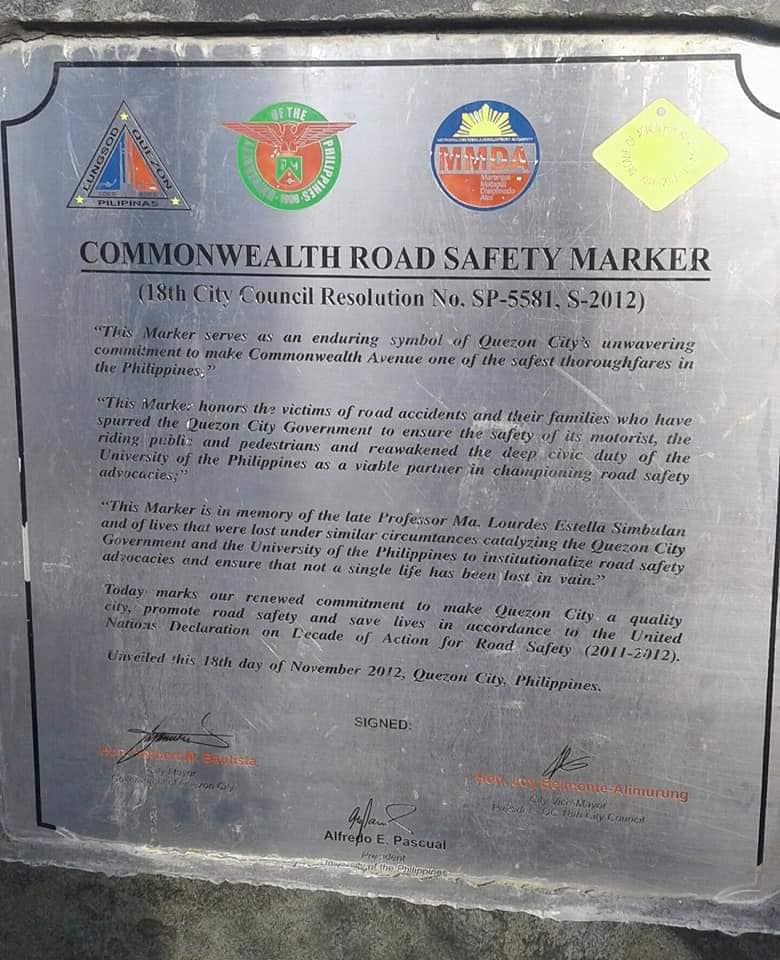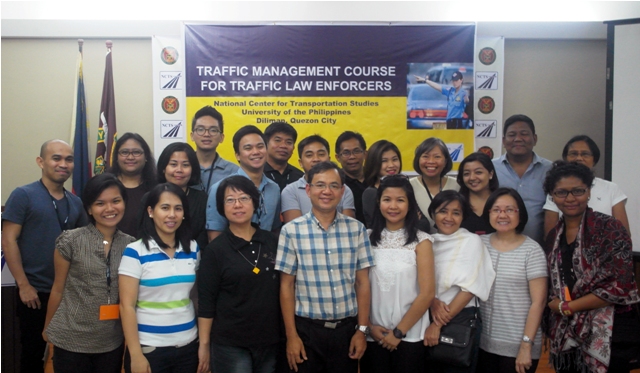May 13, 2011 marked a tragedy that sent shockwaves throughout the Philippine journalism community and the academe.
Veteran journalist and journalism professor Lourdes Simbulan, popularly known as Chit Estella, was killed instantly that Friday night after a bus slammed into the Toyota Vios taxi that she was riding on Commonwealth Avenue in Quezon City. She was on her way to U.P.-Ayala TechnoHub, located along the major highway, for a reunion with her high-school classmates.
The crash site showed the white cab with its trunk and rear passenger compartment completely crumpled. The bus, operated by Universal Guiding Star, sped off after the collision. The driver had allegedly been racing another bus for passengers before colliding with the taxi carrying Estella.
Her death was reported as an “accident,” but the tragedy that occurred a decade ago could have been prevented.

A road safety marker on a sidewalk along Commonwealth Ave.
Over a year after her death, the Commonwealth Road Safety Marker was put up by the local government on a sidewalk near the Ayala TechnoHub. It was to mark “the renewed commitment to make Quezon City a quality city, promote road safety and save lives.”
But 10 years after the fatal crash, no one has yet been held accountable for Estella’s death.
“The defense claims that it was the taxi driver’s fault because he allegedly reversed on the highway,” said lawyer Arno Sanidad, who represents Estella’s family in the criminal case against the two bus drivers involved in the incident. “But we are arguing that this tragedy was a result of reckless imprudence.”
Respected journalist and educator
Estella was an institution among local media practitioners, renowned for her fearlessness and dedication to uncovering the truth and holding the powerful accountable throughout her three-decade career.

A journalist for 30 years
Before becoming a trustee and editor of VERA Files, she worked for many years as a senior reporter for Ang Pahayagang Malaya and had a short stint at the news desk of the Philippine Daily Inquirer. Then she joined The Manila Times as managing editor and was later appointed as editor-in-chief of Pinoy Times, a Filipino tabloid that extensively covered the excesses of former President Joseph Estrada. She was also a professor at the University of the Philippines College of Mass Communication.
In 2016, VERA Files set up The Chit Estella Road Safety Page, which publishes in-depth reports on Philippine road safety issues. VERA Files has also partnered with the UP Department of Journalism for the Chit Estella Student Journalism Awards in the annual Philippine Journalism Research Conference.
A decade of delays
Sanidad said the COVID-19 pandemic is the latest setback in proceedings that have dragged on at the Quezon City Regional Trial Court (RTC) Branch 83 for 10 years.
“We have finished presenting evidence that we believe is sufficient to convict, so the trial is now in the presentation of defence evidence phase,” he said. “The last setting was in March 2021, but because of COVID, nearly all hearings have no definite schedule. Those that have been cancelled will take months to reset.”
Sanidad, a veteran litigator who teaches at the University of the Philippines College of Law, said the pandemic adds to the problems that already saddle Philippine courts.
“This is really how cases go on,” he said. “Hearings here happen once every four to six months because the courts also have other cases that they are handling. We can’t do anything about this.”
Lawsuits and probes
Sanidad added that this case had “more extraordinary circumstances than normal” that contributed to further delays. One was that the defense changed counsel twice.
“The first lawyer was Sal Panelo, who withdrew from the case and was then appointed to the Duterte administration,” he said. “It took some time to get a new lawyer, who was then replaced by someone from the Public Attorney’s Office, which is also swamped with cases.”
Salvador Panelo had been a veteran defense lawyer, known for taking on high-profile cases, before being appointed Chief Presidential Legal Counsel by President Rodrigo Duterte in June 2016.
Sanidad said other causes include the prosecutor and one of the defense lawyers suing each other, as well as the judge being investigated by the Supreme Court.
RTC Branch 83 presiding judge Ralph Lee became famous as the “jet ski judge” for using his jet ski to help more than 100 people stranded on rooftops in Novaliches, Quezon City. This was amid heavy flooding caused by Tropical Storm Ondoy in September 2009.
In 2012, Lee was granted clemency by the Supreme Court after he was fined P20,000 in March 2009 for his failure to decide on several cases within the period required by law.
Justice delayed is justice denied
For Estella’s family, the setbacks that they have endured over the last 10 years have been nothing short of excruciating.
“Words cannot fully describe our frustration,” said Estella’s husband Roland Simbulan, who is also a U.P. professor. “We feel frustrated at the sad state of our justice system where the process is so slow even in high-profile cases like this. I can now understand what other families of victims of car crashes go through.”
He added that he has also heard of instances where even if the victim’s side wins, the court’s decision is never fully enforced even years after the judgement is rendered.
Plenty of laws, not enough enforcement
The decade following Estella’s death has seen a more intensive road safety campaign in the Philippines, which includes the passage of numerous laws aimed at protecting all road users.
One of these is Republic Act 10916 or the “Road Speed Limiter Act of 2016,” which lapsed into law in July 2016. The measure requires the installation of a speed limiter on public-utility vehicles (PUV) like buses, that would control a vehicle’s speed and prevent deadly crashes like the one that took the life of the journalist/educator.
The World Health Organization (WHO) said in its Global Status Report on Road Safety that road crashes are the top killer of people aged 5 to 29 years old worldwide. It also said that four in five road-traffic deaths around the world in 2016 occurred in middle-income countries like the Philippines.
But Simbulan said the enforcement of these laws remains problematic.
“Often, the VIPs in government, including law enforcers themselves, are violators of our road safety rules, but they are not penalized or punished,” he said. “We do not need more laws on road safety to be passed. Let us just exercise good governance and professionalism so that all existing laws on road safety can be fully implemented.”

A stretch of the busy highway. Photo from PNA.
Indeed, Commonwealth Avenue, which has been dubbed a “Killer Highway” for the high number of road crash incidents and deaths that have occurred there, was fully revamped some four months before the crash that took Chit’s life.
In January 2011, the Metropolitan Manila Development Authority implemented new traffic regulations on the thoroughfare. These include designated PUV lanes, strictly implementing loading and unloading zones, as well as a 60-kilometer-per-hour speed limit along the thoroughfare.
Celebrating Chit’s life
A decade has passed since Estella’s death, but the family she left behind so suddenly that Friday night said they wish to celebrate her storied life in a positive way.
“We prefer to commemorate her 10th death anniversary not on the day of her fatal road crash on May 13, but on her birthday, which is on Aug. 19,” he said. “Here, we plan to continue to celebrate her life by launching her unpublished short stories for children.”
Chit Estella Simbulan would have been 64 years old today.





